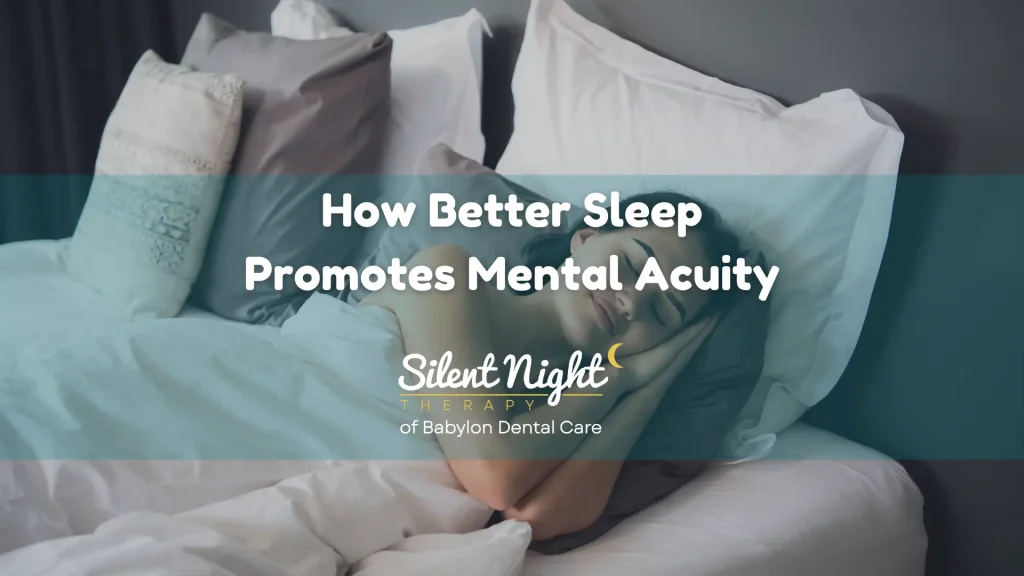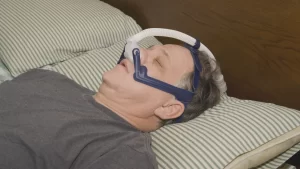
Are you struggling with sleep apnea or similar health conditions and finding it increasingly difficult to stay sharp and focused? You’re not alone. Here at Silent Night Therapy, we understand the crucial role quality sleep plays in maintaining mental acuity. Our office excels in using oral appliance therapy and other techniques to treat sleep apnea and help you get the deep, restorative sleep you need. Today we’ll explore the fantastic connection between better sleep and a sharper mind, and how treating sleep apnea can help you regain your mental edge and zest for life.
Dynamic Toc TestWhat Is “Mental Acuity?”
So, what exactly is mental acuity? It’s your brain’s ability to think clearly, concentrate effectively, learn new information, and efficiently solve problems. Mental acuity encompasses your cognitive functions, memory, and attention span. When your brain is firing on all cylinders, you’re better equipped to handle the demands of daily life — whether it’s nailing that presentation at work or remembering where you put your car keys.
How Better Sleep Sharpens Your Mind
A good night’s sleep is like a magical elixir for your brain. While you’re catching those Z’s, your brain is busy consolidating new information, clearing out mental waste, and restoring your cognitive abilities. As a result, better sleep means you’re more likely to experience improved memory, faster decision-making, and a boost in creativity.
How Poor Sleep Impacts Mental Acuity
On the other hand, poor sleep can seriously mess with your mental acuity. A few of the ways that poor sleep hampers your mental acuity include:
- Impaired cognitive function: Sleep deprivation affects the brain’s ability to process information, make decisions, and solve problems. This can lead to decreased productivity, poor judgment, and an increased risk of accidents.
- Memory issues: During sleep, the brain consolidates new information and forms long-term memories. This process is disrupted without adequate sleep, leading to difficulties in retaining new information and recalling previously learned material.
- Reduced attention span: A lack of sleep can make it challenging to focus and concentrate on tasks, impacting work or school performance.
- Slower reaction times: Sleep deprivation can slow your response time, making it harder to react quickly in situations requiring fast thinking or physical coordination, such as driving or playing sports.
- Decreased creativity: A well-rested brain is better equipped to think creatively and generate innovative ideas. Poor sleep can hinder this ability, stifling your imagination and problem-solving skills.
What Is Sleep Apnea, and How Does It Impact Your Sleep?
Sleep apnea is a sleep disorder that causes people to experience repeated interruptions in their breathing during sleep. These pauses can cause people to wake up throughout the night and lead to a fragmented sleep pattern, leaving them feeling groggy, irritable, and struggling to focus throughout the day. And we’re not just talking about one or two restless nights — sleep apnea can seriously disrupt your sleep quality on an ongoing basis, making it all the more important to find an effective treatment.
Mental Health Conditions Related to Sleep Apnea
In addition to wreaking havoc on your mental acuity, sleep apnea has been linked to a variety of mental health issues. Anxiety, depression, and mood swings are all common among individuals with sleep apnea. This further emphasizes the need for proper treatment — not only to sharpen your mind, but also to support your overall well-being.
Sleep Apnea Treatments: CPAP Machines vs. Oral Appliance Therapy
 When it comes to treating sleep apnea, there are two popular options: Continuous Positive Airway Pressure (CPAP) machines and oral appliance therapy. CPAP machines deliver a continuous flow of air through a mask that covers the nose or mouth. This air pressure keeps the airway open and prevents it from collapsing during sleep, which helps alleviate sleep apnea symptoms.
When it comes to treating sleep apnea, there are two popular options: Continuous Positive Airway Pressure (CPAP) machines and oral appliance therapy. CPAP machines deliver a continuous flow of air through a mask that covers the nose or mouth. This air pressure keeps the airway open and prevents it from collapsing during sleep, which helps alleviate sleep apnea symptoms.
Pros:
- Effective in treating moderate to severe sleep apnea
- Can improve sleep quality and reduce daytime sleepiness
- May lower blood pressure in people with hypertension
Cons:
- Some users find the mask uncomfortable or claustrophobic
- Can be noisy, which may disrupt sleep for the user or their partner
- Requires regular cleaning and maintenance
- Not as portable as oral appliances, which can make traveling more challenging
Oral appliance therapy involves the use of custom-fitted dental devices worn during sleep. These appliances reposition the jaw and tongue to maintain an open airway, thereby reducing the severity of sleep apnea. Oral appliances come in various designs, but they generally work by either advancing the lower jaw or holding the tongue in place.
Pros:
- Often preferred by users for their comfort and ease of use
- More discreet and portable than CPAP machines, making them ideal for travel
- Quieter and less invasive than CPAP therapy
- May be more suitable for people with mild to moderate sleep apnea
Cons:
- May not be as effective as CPAP for severe sleep apnea cases
- Can cause temporary jaw discomfort or tooth movement
- Requires regular dental check-ups to ensure proper fit and function
Let Silent Night Therapy Help You Get the Quality Sleep You Need to Perform at Your Best
At Silent Night Therapy, our expert team is passionate about helping you overcome sleep apnea and unleash your mental acuity. With a personalized treatment plan, we’ll guide you toward the best solution to improve your sleep quality and mental sharpness. We’re dedicated to understanding your individual needs and working closely with you to ensure you receive the most effective treatment. We also understand that navigating the world of sleep therapy can be overwhelming, and we’re here to make the process as seamless and stress-free as possible. From your initial consultation to ongoing support, we’ve got your back every step of the way.
Don’t let sleep apnea hold you back any longer. Reach out to Silent Night Therapy today to start your journey toward better sleep and a sharper, more focused mind. Call us today at (631) 983-2463 or visit our contact page to set up a consultation.
Related posts
Why an at-home sleep study is often better than in a lab